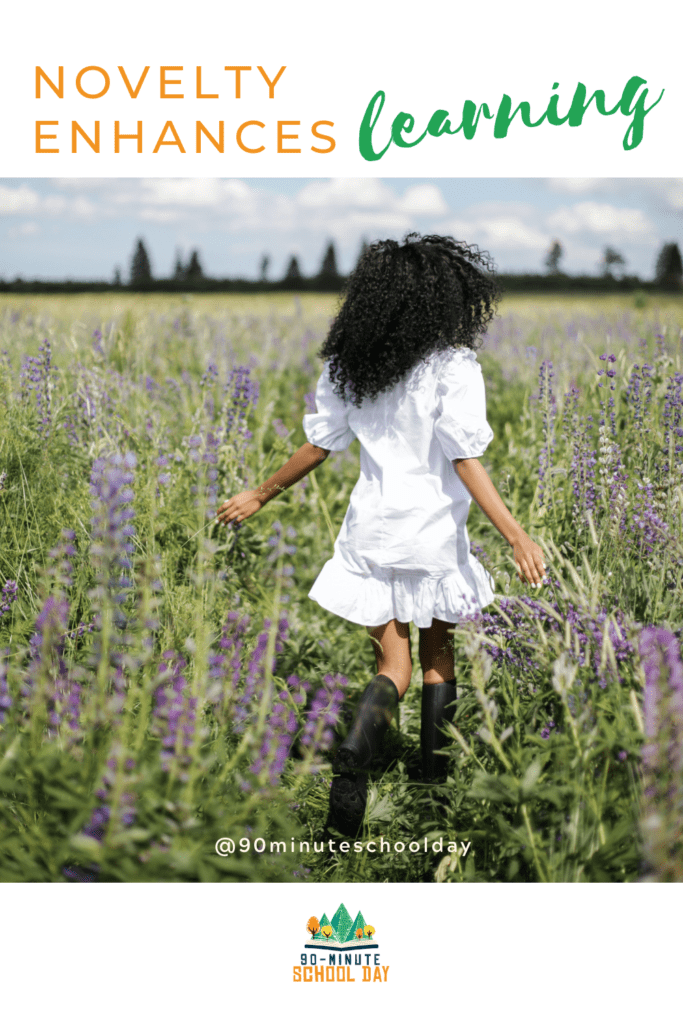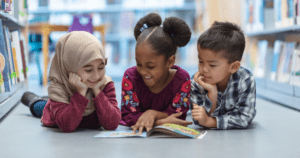Ending the battles and curbing the conflicts with our children is the desire of every parent. Another is to encourage learning and a lifelong love of it. A third parental aspiration is raising children with autonomy, confidence and character. These noble ideals are all achievable through the pro-active approaches that we’ve discussed in 6 Steps to Solve Spring Fever. The final step in this series is how novelty enhances learning.
First, we must identify novelty and why it impacts learning. Then we will discuss how to put it into practice in our homes.
What is novelty?
Novelty is something new, unusual or unique. It is the zest of life, the fertile soil that births the seedling of curiosity. Think about it. When you encounter something new, you pause and give it your undivided attention. Intrigued, you choose to delve further into understanding the who, what, when, where and how to learn more.
This is where discovery and science intersect. Next, these new observations are cross referenced with what we know (history). Then we analyze and record our findings (memory). We communicate orally or perhaps write it down, (documentation) for later.
Novelty is the natural learning process. It is inherent to the human spirit; we are each engaged in life-long learning and it doesn’t necessarily stem from a book or classroom. In fact, I would argue that the majority of learning happens outside of these realms, it happens as we live.
– Kelly Edwards
Why is it important?
When people learn, we form associations between what is known and what is novel. Our brain, specifically the hippocampus, compares and contrasts the new with the old. This analyzing helps us make predictions or educated assumptions. It alters our behavior.
The hippocampus is used in memory creation and spatial navigation.
How it works.
Novelty, encountering something new, signals the hippocampus in the brain to activate. The hippocampus discovers and processes the sensorial information of the new item or experience against prior knowledge. When the new information differs from the old, the hippocampus triggers a dopamine release to the midbrain. This is the area of the brain that is involved in the more familiar reward system or feedback loop of learning. The midbrain then releases dopamine that is transmitted back to the hippocampus. This loop between the hippocampus and midbrain builds memory. Also worthy of note, the hippocampus is one of the few areas in the brain that generates new neurons.
The hippocampus generates neuron growth and is stimulated by novelty over normality. In fact, neophilia (people who love to try new things) is a predictor of longevity. The dark side of this is that addiction: both substance and experiential addictions (gaming, food, sex, and gambling) engage with the novelty-hippocampus-dopamine loop.
To avoid the negative side of novelty is to employ diversity: to have novelty within novelty. Be mindful of not using the same form of novelty. Try to break up habits and routines with varied and different integrations and disruptions. Make a goal to be mindful of trying something new (within reason) each day.
How to employ novelty in learning?
Now that we understand what novelty is and why it is important in memory formation, we can discuss some practical applications to incorporate in learning. Here are some seed ideas for increasing novelty in your homeschool.
- Change.
- Change the routine.
- Change the environment.
- Change the subject.
- Decide to do new things. Say “Yes.”
- Plan to learn or work on a new item of interest.
- Ask questions! With accountable talk.
- Be silly!
- Use play invitations. (Leah McDermott has a great calendar and approach)
- Go outside – nature is alive, living, and always changing!
- Sing and dictate.
- Dance.
- Wear a clown nose or write a letter on your face in makeup.
- Child chosen memory work.
- Swing and skip count.
- Try caveman eating, no utensils!
- Eat outside.
- Eat on the floor.
- Toy rotations.
- Chore rotations.
- Do something hard for yourself and your kids – model doing hard things.
- Swap bedrooms, bathrooms, seating arrangements.
- Play a game – but change some of the rules.
- Dictate a story about what happens next in a magazine ad.
In closing, have fun! Be impulsive. Practicing novelty in learning is brain food and exercise. Life-long learners are curious individuals regardless of age. Encourage it and lead by example! How will you practice novelty next?





